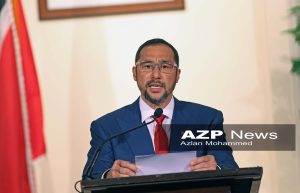Caption: The mothballed refinery at Pointe-a-Pierre. AZP News/Prior Beharry
Part 2
AZP News Guest Commentary

TRINIDAD and Tobago continues to grapple with significant economic challenges, and concerns about the government’s ability to address these issues grow.
Rising debt, economic stagnation, and the closure of key state-owned enterprises have drawn sharp criticism from various sectors. These fiscal difficulties are compounded by a lack of meaningful reforms and poor financial management.
Since 2015, national debt has surged to over 67% of GDP, compared to 51.1% in 2014. The government has frequently turned to the Heritage and Stabilization Fund (HSF) as a short-term solution, withdrawing more than US$2.5 billion to cover budget gaps.

This reliance on withdrawals has left the country more vulnerable to external shocks, as oil and gas revenues continue to decline.
Over the last nine years, both Prime Minister Dr Keith Rowley and Finance Minister Colm Imbert have faced scrutiny from economists, opposition and the media for their handling of the economy.
Imbert, an engineer by profession, has been criticised by some for lacking the financial expertise required or effective fiscal management. Similarly, Rowley’s leadership has been called into question by various critics due to the administration’s failure to implement necessary reforms to diversify the economy.
Heritage and Stabilization Fund draw downs
Created to safeguard future generations, the HSF has seen substantial withdrawals since 2015. More than US$2.5 billion was withdrawn between 2016 and 2022, reducing the fund to just over US$5 billion by the end of 2023, down from a high of US$6.5 billion in 2014.
On December 18, 2023, the government made an additional US$1 billion withdrawal, but it was only disclosed on June 18, 2024, sparking further concerns about transparency.
This delay prompted calls for clearer guidelines regarding HSF withdrawals and more consistent public communication about the fund’s use. While the fund’s balance remains crucial to economic stability, these actions have raised ongoing debates about the sustainability of the government’s strategy.
The Auditor General and other finance officials have recommended amendments to the HSF Act to improve clarity around the processes for deposits and withdrawals, ensuring more careful management and timely public disclosure.
The cases of Petrotrin and Caroni Limited
The PNM government’s failures extend beyond the mismanagement of the HSF and the lack of economic diversification. Their handling of state-owned enterprises, such as Petrotrin and Caroni Limited, has drawn widespread criticism.
The closures of these entities have had profound and lasting socio-economic impacts, raising critical concerns about the government’s decision-making and ability to manage key industries effectively.
Petrotrin, once the largest oil refinery in the Caribbean and a cornerstone of T&S’s energy sector, was abruptly closed in 2018. The government justified the decision by citing TT$12 billion in accumulated debt and operational inefficiencies. However, the long-term consequences of this closure have been severe, and many argue that restructuring or privatisation would have been more viable alternatives.

The closure resulted in over 5,000 workers losing their jobs, significantly increasing unemployment in South Trinidad. The ripple effects devastated local communities such as Pointe-à-Pierre and Marabella, where businesses reliant on Petrotrin’s operations collapsed.
The closure also led to T&T becoming a net importer of refined petroleum products, resulting in a significant rise in foreign exchange expenses. By 2023, foreign reserves had dropped to around US$6 billion, a 39% decrease from US$9.8 billion in 2015.
The Oilfields Workers’ Trade Union (OWTU) had proposed alternative solutions, including a public-private partnership and operational reforms, but these were not seriously considered.
The closure of Caroni Limited in 2003 by a previous PNM government devastated T&T’s agricultural sector. Caroni was responsible for a significant share of the country’s sugar production and employed approximately 9,000 workers. The closure had long-lasting socio-economic consequences, particularly in rural areas dependent on sugarcane farming.
The closure led to widespread unemployment and increased poverty, especially in Central Trinidad, where communities relied heavily on sugar production.

The government had promised to diversify the agricultural sector following Caroni’s closure, but efforts to convert sugarcane fields into farmland for other crops largely failed. By 2023, T&T was spending over US$900 million annually on food imports, underscoring the failure to achieve food security.
As part of the closure process, the government pledged to distribute 77,000 acres of former sugarcane land to displaced workers. However, the process has been plagued by delays, mismanagement, and alleged corruption. Many former Caroni workers are still waiting to receive the land they were promised.
A recipe for a failed state
T&T’s downward economic spiral over the last nine years under the PNM administration has brought the nation closer toward a failed state. The reliance on borrowing and withdrawals from the HSF, coupled with a lack of meaningful reforms or diversification strategies, has left the country in a precarious position.
As debt levels rise and public services deteriorate, the absence of a long-term economic vision has become increasingly apparent.
Without immediate reforms to reduce debt and diversify the economy, Trinidad and Tobago risks losing control over its financial future.
Shiva Ramnarine, founder of Mobius Solutions Consultancy, has over 25 years of experience as an executive and finance business leader. He is also a former chief financial officer of the Telecommunications Authority of Trinidad and Tobago. The views and opinions expressed in this commentary do not necessarily reflect those of AZP News, a Division of Complete Image Limited
See Part 1 below:
![]()











